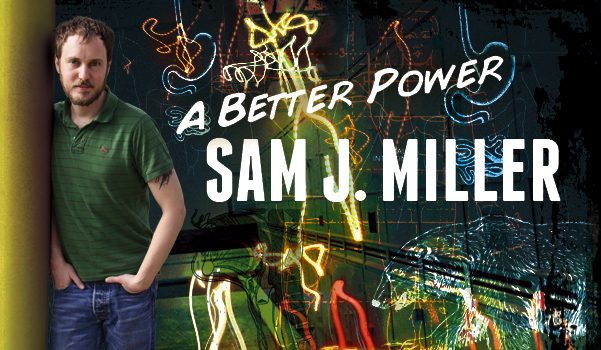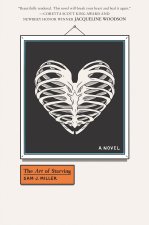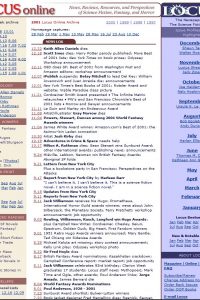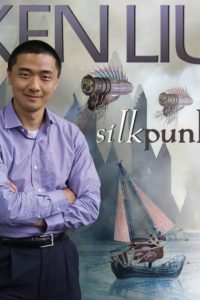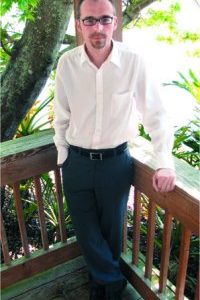Sam J. Miller: A Better Power
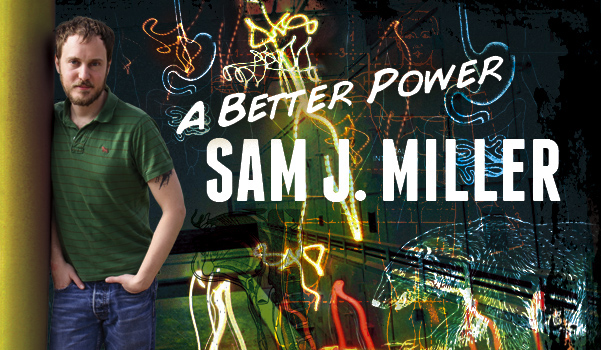
Sam Joshua Miller was born February 7, 1979 in Hudson NY. He attended Rutgers University, where he studied cinema studies and Russian language and literature (and met his future husband).
Miller began publishing stories in ’zines and online in the early 2000s, and attended the Clarion Science Fiction and Fantasy Writers’ Workshop in 2012. In recent years he’s published a slew of award-quality short fiction, including Shirley Jackson Award winner ‘‘57 Reasons for the Slate Quarry Suicides’’ (2013) and nominee ‘‘Angel, Monster, Man’’ (2016); Sturgeon and Nebula Awards finalist ‘‘We Are the Cloud’’ (2014); World Fantasy Award finalist ‘‘The Heat of Us: Notes Toward an Oral History’’ (2015); and Sturgeon, Shirley Jackson, and Nebula Awards finalist ‘‘Things with Beards’’ (2016).
His debut novel, YA The Art of Starving, came out this month (and is reviewed elsewhere in this issue). Blackfish City, an adult SF novel, is forthcoming.
Miller lives in New York City with his husband, and works as a community organizer for a homelessness organization.
Excerpts from the interview:
‘‘I’m the last in a long line of butchers. My father trained me as a butcher, he was a butcher, and so was his grandfather. We had a family butcher shop in Hudson NY, which went out of business when I was 16 or 17, when WalMart came to town. I’ve been a vegetarian since then. My butcher father dealt very well with the twin betrayals of me being gay and being a vegetarian. He found out about them within months of each other.
‘‘I’ve been writing and publishing fiction since about 2003, but usually in things with extremely small readerships, like ‘zines, or websites that died immediately or didn’t have much of a reach. I’ve always written speculative fiction, but not exclusively, and I didn’t focus on speculative fiction markets until I went to Clarion in 2012, which is when I started to get good, or at least better, I like to think. I made my first pro sale in 2013.”
*
‘‘The Art of Starving is my debut novel, but it’s also the seventh novel I’ve written. Like many people, I write a lot and don’t always sell the first thing I write. I had been trying and failing to write a commercial novel. I was trying to write a novel that would sell, and that didn’t have a lot of cursing or gay sex, because there was a certain part of my brain that thought you couldn’t do that in YA. It helped that at Clarion my teachers Holly Black and Cassandra Clare said, ‘No, if you think there’s something you can’t do in YA, tell me what it is, and I’ll show you the book that does it already.’ I finally realized I should really not try to write the book I thought would sell – I should write the book that is my story, in the sense that it’s my experience, and the thing that I’ve been frightened of talking about, and the thing that involves putting myself out there and discussing things that are tough to discuss, and that I couldn’t have told without saying some things that many people prefer not to see on the page. When I decided to go there, that was the novel that came to life for me as a writer in a way my previous novels hadn’t.”
*
‘‘There is power that comes from violence, and there is power that comes from self-harm. I wish that wasn’t true. It’s just a reality for many people who’ve been brutalized or victimized or harmed, or who feel that they have no control over any aspect of their lives – the only control they have is how they control themselves. They can’t hurt the people who are bullying them, so they hurt themselves. Or they turn the violence outwards, and that becomes a source of power: hurting others as you have been hurt. I wanted to tell a story about how the power you get from self-harm is much less powerful or sustainable than the power you get from loving yourself, loving the people around you, and acknowledging that you are amazing and you don’t need to hurt yourself. You don’t need to make yourself look a certain way or act a certain way in order to be amazing. It’s a really hard place to get to, and a lot of adolescents and grown-ups have a hard time with that. For me it’s real, in the sense that the story I’m telling is about the journey to the power that comes from self-acceptance, and how that’s a better power. In the end, that’s the true source of power. Any other power is pretense, a fiction, or an act of destruction. There are people who don’t read the book as a dark science-fiction fantasy novel. For what it’s worth, that’s not me, but I think it’s a valid reading.”
*
‘‘I usually have a million different story molecules bouncing around in my brain, like a character who is awesome, or a speculative ability that’s awesome, or a setting that’s awesome, or a news story that I read six years ago, or a relationship between two people. They bounce around, and it isn’t until they start to link up that I find the story I was trying to write. I read this article about a journeyman fighter, which is a fighter whose job it is to lose. He’s a professional fighter, a very talented fighter, but somebody’s gotta lose so the other fighters can build up the records they need to become stars. Thinking about that, I wanted to write a story about that person, and he became one of the protagonists, because I wanted to know what that did to you, to lose for your job. It’s also more than that, because you are shaping these younger fighters, helping them, serving as their teacher, showing them how it works in a way that means that even though it’s not your destiny to be the super star, you have a part in that destiny. I had a bunch of different pieces I wanted to play with, and that ended up in the same sandbox.”
*
‘‘A lot of my early exposure to the genre was horror movies. My mom loved horror movies. She never let me see them, but she always watched them. But then she would fold and say ‘All right, we can see the movie that will give you nightmares.’ Then it would give me nightmares. I’ve always been fascinated by and drawn to the shit I wasn’t supposed to do or see, like I read every Stephen King book when I was 13 or 14. Ray Bradbury was the first science fiction writer that I fell in love with and got really excited about, but I also loved Alien. Even though I don’t write a ton of horror, I want to write about what scares me. That’s always been the thing that as a reader has excited me the most. I want to read about what scares me. I love Octavia Butler – she’s one of my favorite writers – because her work is about what scares me. It’s about the scary shit, and the scary shit is as much about racism and misogyny as it is evil body-hopping in the world. My way into fiction has always been through what I’m scared of.
‘‘I love activism narratives. I love narratives about fighting back. As much as I love reading about what scares me, I love reading about how we fight back. Finding out that the thing that seems immortal, invincible, is totally killable. The monster you think is immortal – you can put a stake through its heart. The systemic oppression that you think is bigger than you and impossible to fight – you can fight it. You may not win the way you want to win, or you might win and have a whole other set of problems, but the stories about fighting are something I’ve always gotten excited about. What am I not strong enough to fight against, but someone could be?”
*
‘‘I’m in this exciting and terrifying moment in my writer life where my book is about to come out and I can’t control it, and I can’t control who’s reading it. I got a one-star review on Goodreads and my whole day was ruined. It’s also interesting because with The Art of Starving I’m writing about some difficult stuff, and a lot of folks feel strongly about some of these issues. There was a level on which I wrote this book because I thought, ‘There aren’t a lot of male eating disorder narratives.’ I wanted to be like, ‘Look, young women are disproportionately hurt by patriarchy and body image tyranny, but they’re not the only ones affected.’ I wanted to be able to speak to people who are male, or female, or non-binary, or genderqueer, or whatever, but I also understand that people who have that experience might not want to read a narrative about that. It might be triggering. It’s a tough thing, I get that, and I understand why someone who’s a survivor of those issues might not want to read it, but it was important to me.’’


